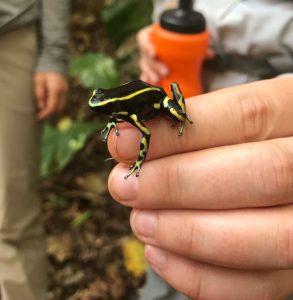When: Friday, September 27, 2019
Time: 12:00 – 1:00pm (Eastern Daylight Time (EDT), UTC-4)
Title: “Biodiversity Observations for Decision-Making: From Data to Decision”
Presenter: Mike Gill
Short Bio: Mike Gill is the Director of the Biodiversity Indicators Program at NatureServe. Mike’s career has been driven by the strong belief in the fundamental value of high quality and effectively delivered biodiversity data to inform timely conservation actions. For the past 25 years, Mike has led the design and implementation of user-driven and results-oriented biodiversity conservation, research, and monitoring programs. These programs have spanned the planet and have involved partnerships with aboriginal, national and sub-national governments, academia, industry and NGOs. Mike has advised multiple governments, senior officials, and Environment Ministers on biodiversity conservation policy and published over 50 scientific publications, books and book chapters. Mike is an Honorary Fellow of the UN Environment World Conservation Monitoring Centre and currently holds an elected position as Co-Chair of the Group on Earth Observations – Biodiversity Observation Network. Mike lives with his wife, two kids and dog in Wolfville, Nova Scotia, Canada. In his spare time, Mike coach’s hockey, serves as a Director in a new company conducting mass installations of solar systems in Nova Scotia, and when not in front of a computer, spends as much time outdoors as possible, either involved in volunteer biodiversity monitoring, skiing, biking or hiking.
Abstract: With biodiversity loss accelerating we must find ways to better mainstream biodiversity into development decisions and conservation actions. Underpinning this is the need to produce relevant and trustworthy information on biodiversity status and trends and the mechanisms driving these trends. The Group on Earth Observations – Biodiversity Observation Network (GEO BON) is working globally with national and regional partners to enhance existing and build new, efficient and powerful Biodiversity Observation Networks that directly support conservation and sustainable development policy.
With drivers of biodiversity loss operating at scales beyond national borders, it is important that a national BON does not develop and operate in isolation, but rather draws from, aligns with and contributes to broader regional and global biodiversity observation efforts to improve our collective ability to detect and attribute biodiversity trends. Balanced against this, is the need to build systems that produce relevant data that effectively informs national and sub-national policies. In response, GEO BON is working with its partners to develop a flexible framework and design process, based on the Essential Biodiversity Variables, for the establishment of interoperable national Biodiversity Observation Networks.
>> Registration closed




